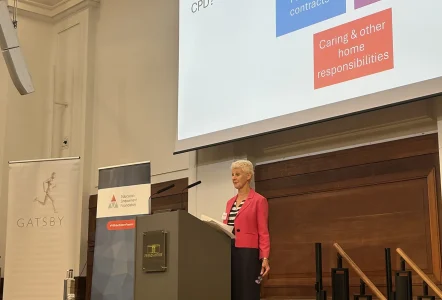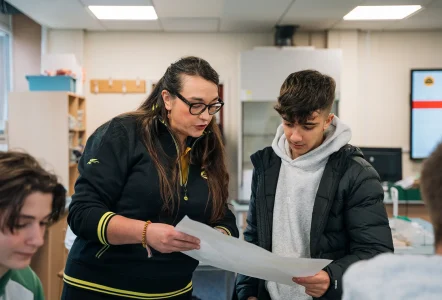Further Education (FE) is a powerful driver of skills and opportunity, led by dedicated teachers across the sector. To support Further Education teachers, Gatsby commissions work to build the evidence base and collaborates with providers, teacher educators and researchers to support sustainable solutions.

Tackling the teacher crisis
Further education (FE) in England plays a vital role in preparing individuals to meet the skills needs of our economy and enjoy fulfilling careers. Yet the FE sector continues to face persistent challenges in recruiting and retaining teachers, particularly in areas such as construction, engineering and digital. Despite their critical role, FE teachers are paid up to 23% less than their counterparts in secondary schools, and in some subjects salaries can be significantly lower than equivalent roles in industry. Whilst FE teachers value the opportunity to support students’ learning, retention is poor, with nearly half of FE teachers leaving the profession within three years.
A strong and resilient FE sector, built on a foundation of high-quality, experienced teachers, is essential – not only to support every student in achieving their aspirations, whether that’s employment, further study, or both – but also to develop the skilled technical workforce the UK needs to drive infrastructure, innovation, and economic growth.

Generating policy insights
At Gatsby, our work focuses on building the evidence base and generating meaningful policy insights that can be turned into actionable recommendations.
We aim to support senior leaders in FE to plan and enhance their teaching workforce, while also helping policymakers and partners to gain a deeper understanding of the realities of being an FE teacher. This includes addressing key challenges such as recruitment and retention, access to continuous professional development (CPD), and the pressing need for accurate, timely data. Our insights contribute to the development of long-term, strategic solutions for strengthening and sustaining the FE teaching profession.
High-quality teaching is the backbone of further education and this government is committed to supporting innovative ways to attract and develop talented individuals from industry into the profession, so we can drive up standards and give learners the skills they need to seize opportunity and drive growth.
Our work supporting the Further Education workforce
Further education (FE) teachers play a vital role in delivering technical education and supporting the skills needs of the economy, yet their pay and working conditions have received far less attention than those of school teachers. Unlike their counterparts in schools, FE staff are not covered by an independent pay review body, and current evidence suggests they can earn up to 23% less for comparable roles. This disparity undermines efforts to recruit and retain high-quality teachers in those subject areas facing persistent staffing shortages.
Addressing these issues requires a long-term strategy that will see pay aligned with that of school teachers, and ensure manageable workloads and job security across the sector. There is a need for more comprehensive and up-to-date research into the experience of FE teachers to support policymakers and sector leaders develop solutions that recognise and value the contribution of FE teachers – ensuring the sector remains sustainable and equipped to meet future demand.
For FE teachers the nature of initial teacher education (ITE) and professional development opportunities vary. The majority of FE teachers train in-service – entering FE with experience from industry. We commission work to understand the nature of teaching roles in FE, and how people can be well-prepared to succeed in them.
We work with partners to gather this evidence, aiming to inform policy and practice. For example, we commissioned a three-year research programme to explore the subject-specific pedagogies for technical education teaching in STEM subjects. Gatsby also supported the OECD to explore how different country systems ensure that teachers and trainers have the right set of skills and are fully prepared for their role, balancing entry requirements and flexibility for training in order to attract good candidates.
While industry professionals possess deep technical expertise, they may lack the confidence to transition seamlessly into contributing to teaching. The Industry Associate project seeks to bridge this gap by providing a structured, supportive training path that equips industry professionals with practical teaching tools and classroom ready skills at the start of their teaching journey.
Gatsby is working with five FE colleges, Edge Hill University, and the Department for Education on a pilot programme designed to equip Industry Associates with the confidence and skills to succeed, creating a more sustainable pipeline of teaching talent.
For FE colleges, the programme will offer an opportunity to support industry expertise into teaching, enriching the learning experience for students, and helping to support local and regional priorities.
Industry Associates contribute to teaching in a range of ways – from offering masterclasses or short teaching sessions, to advising on curriculum content. They typically make these contributions alongside their industry role. However, for some the Industry Associates training may be a first step to a new career as an FE teacher as they progress to initial teacher education programmes.
The Industry Associate project is an ambitious initiative, but its goals are achievable with sustained collaboration and commitment. The insights gained from this project will create a framework that can be scaled and adapted nationally.
For more information, email: FEworkforce@gatsby.org.uk
The shortage of further education teachers in certain fields, such as construction and engineering, is a persistent issue in England. With better data, we will be able to understand and address the barriers to entry and the reasons teachers leave FE.
Reports & publications
Building a stronger FE college workforce: how improving pay and working conditions can help support FE college teacher supply
New insights on the FE workforce, including pay disparities between FE teaching and industry and other factors that may impact on recruitment and retention.
Author(s)
Lillian Flemons, Dawson McLean, Suzanne Straw, Gillian Keightley
Research Into Technical Education Teaching Roles
A research report by York Consulting LLP provide a categorisation of technical education teaching roles in further education (FE) and to build a shared understanding of the teaching job roles supporting 16-19 and adult education.
Author(s)
York Consulting
Latest updates

21st Jan 2026
Further Education’s teacher educators: who are they, what is their work, and what are their professional development priorities?

22nd Aug 2025
EEF and Gatsby host evidence-informed CPD conference for 16-19 Sector

25th Jul 2025